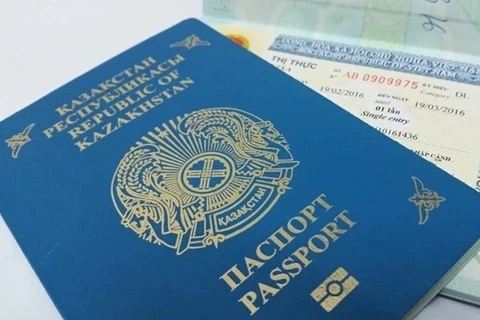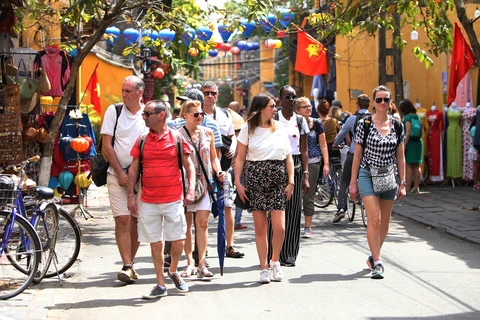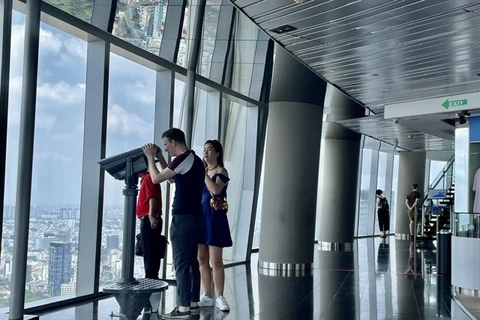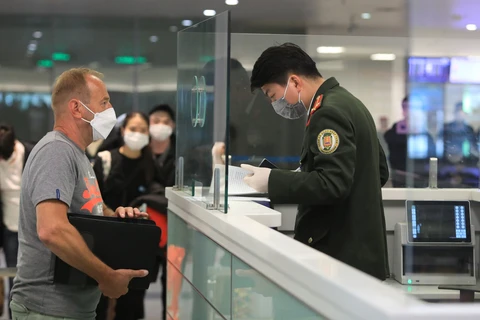Hanoi (VNA) - Identified as a key economic sector, tourism has received much attention from the Government in recent years.
On May 18, the Government adopted Resolution No. 82/NQ-CP on the main tasks and solutions to accelerate tourism recovery and development. On June 24, the National Assembly approved the extension of e-visa from 30 days to 90 days for international visitors to Vietnam, valid for multiple entry during the period; and citizens from countries unilaterally exempted from visas by Vietnam are granted temporary residence for 45 days, an increase from the previous 15 days.
The policy is expected to help boost the recovery of Vietnam tourism. However, can it create breakthroughs for the industry, and what else can be done to improve the competitiveness of Vietnam tourism? Nguyen Trung Khanh, Chairman of Vietnam National Authority of Tourism (VNAT) has talked to the press about the issues.
Reporter: The National Assembly has approved the law on amendments and supplements to a number of articles in the Law on foreigners’ entry, exit, transit, and residence in Vietnam. Foreign visitors to Vietnam will enjoy simplified procedure and a more open policy. What do you think about the impacts of the new policy on the flows of foreign tourists to Vietnam?
Nguyen Trung Khanh: This is one of the successes and very good news for those who work in tourism in Vietnam. The tourism sector and relevant agencies have longed for the change for years and have proposed the Government to make timely adjustments to create favourable conditions for foreign tourists to Vietnam, through which attracting more international visitors and enhancing the sector’s competitiveness.
The National Assembly's approval of adjustment in e-visa issuance and foreign guests’ stay in Vietnam shows the great attention of the Party, State, and National Assembly to tourism as well as the coordination between ministries/ sectors with the Ministry of Culture, Sports and Tourism to create a breakthrough policy.
For tourism businesses, this is a good opportunity to build longer-term tourism products, attract visitors with high spending power and long stay, as well as build a long-term business plan. On that basis, it will add attraction for Vietnamese destinations.
Reporter: Vietnam’s visa policy has been more open and more attractive to visitors. Once they arrive in Vietnam, what should be done to offer them attractive products so that they are willing to spend more?
Nguyen Trung Khanh: I think that the most difficult thing, which is the visa policy, has been removed. However, that is just a necessary condition, and the sufficient condition for Vietnam’s tourism to become more attractive and competitive in international markets is the implementation of more synchronous measures.
Such measures range from creating more unique and attractive tourism products; implementing stronger and more professional promotion programmes, ensuring safety and security in destinations to policies that create favourable conditions for tourists when traveling in Vietnam.
Another important issue is that we need to train sufficient tourism human resources in terms of quantity and quality, thereby providing high-quality services to visitors. We also need to apply information technology in all aspects of the industry.
Combining all these factors will create unique and attractive products and services, enhancing the competitiveness of Vietnam tourism and its attractions in the coming time.
Reporter: Vietnam tourism has undergone a difficult period. What do you think the industry needs to do to quickly recover and speed up in the coming time?
Nguyen Trung Khanh: In the most difficult period, the tourism industry received the attention and direction of the Party, National Assembly, Government, and Prime Minister as well as the coordination of ministries, agencies and localities in overcoming difficulties and creating new momentum for development.
Therefore, in the past time, in the context of post-COVID-19 recovery, Vietnam tourism still maintains connections with target markets, through which information about the destinations and the quality of services is not interrupted. Therefore, when Vietnam officially reopened tourism activities on March 15, 2022, international tourists were able to come and experience Vietnam.
During the COVID-19 pandemic, the tourism industry actively proposed solutions to remove difficulties and obstacles, including advising the Prime Minister to chair two national conferences on attracting international tourists to Vietnam as well as a national conference on tourism.
On that basis, the Government issued a resolution with seven groups of specific solutions, providing important orientations for ministries, agencies, localities, tourism associations to fulfill their tasks, especially the implementation of the Vietnam tourism development strategy to 2030 approved by the Prime Minister.
I think these are breakthroughs that have created positive results in the past time. In the second half of the term 2021-2026, we must try to focus on effectively implementing the Government's Resolution No. 82/NQ-CP.
Specifically, for the Ministry of Culture, Sports and Tourism, we have made recommendations for the ministry to issue an action plan, implementing Resolution No. 82 with 21 groups of direct tasks that the ministry is responsible for. Additionally, there are 23 tasks that the ministry will coordinate with other ministries, agencies, localities and tourism associations to implement.
If we effectively implement this resolution, it will create a premise to regain the growth momentum of Vietnam tourism in the second half of the term as well as achieve more important milestones, making tourism a spearhead economic sector of Vietnam according to Resolution 08 of the Politburo.
Reporter: Thank you very much!


























